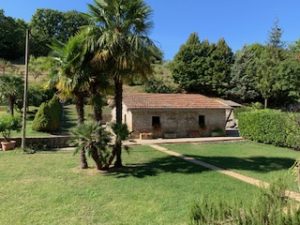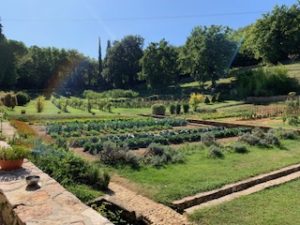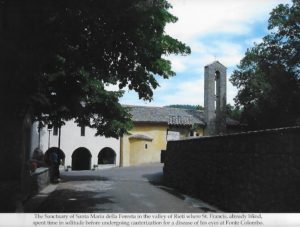|
|
Posted By Teresa Redder, on March 1st, 2024 FEBRUARY ENDS WITH A “LEAP” OF FAITH
Brothers and sisters,
At our Region’s November gathering, we distributed Franciscan Solitude calendars to the Fraternity Ministers and Formation Directors to provide Franciscan inspiration for 2024.
For the month of February, the picture was of the sanctuary of La Foresta in the Rieti Valley, a place very special to St. Francis. The calendar urged us to read Chapter XIX of the Little Flowers of St. Francis. In many respects, this story is similar to the loaves and fishes, requiring patience and faith when our senses are challenged. A great crowd had followed Francis to this property where grapes had been planted. The host priest had doubts that the grape crop could survive this great crowd. This story is a powerful reminder to us of how we must place our trust in God. I would like to share some of my photos with you from my 2019 pilgrimage to La Foresta as you read the story; the last photo is from the calendar…
   
Little Flowers of St. Francis – Chapter XIX
HOW THE VINE OF THE PRIEST OF RIETI, WHOSE HOUSE ST FRANCIS ENTERED TO PRAY, WAS TRAMPLED UNDER FOOT BY THE GREAT NUMBERS WHO CAME TO SEE HIM, AND HOW IT YET PRODUCED A GREATER QUANTITY OF WINE THAN USUAL, AS ST FRANCIS HAD PROMISED; AND HOW THE LORD REVEALED TO THE SAINT THAT HEAVEN WOULD BE HIS PORTION WHEN HE LEFT THIS WORLD
St Francis at one time being grievously tormented with a disease in his eyes, the Cardinal Ugolino, protector of his Order, who loved him dearly, wrote to him to come to Rieti, where there were excellent oculists. St Francis, having received the Cardinal’s letter, set off first to San Damiano, where was Sister Clare, the devout spouse of Christ, to give her some spiritual consolation, intending afterwards to go on to the Cardinal. On arriving at San Damiano, the following night his eyes grew so much worse that he could not see the light, and was obliged to give up going any further. Then Sister Clare made him a little cell of reeds, in order that he might repose the better; but St Francis, owing partly to the pain he suffered, and partly to the multitude of rats, which much annoyed him, could rest neither day or night.
After suffering for several days this pain and tribulation, he began to think that it was sent to him by God as a punishment for his sins, and he thanked the Lord in his heart and with his lips, crying out with a loud voice: “My God, I am worthy of this, and even worse. My Lord Jesus Christ, thou Good Shepherd, who hast shown thy mercy to us poor sinners in the various bodily pains and sufferings it pleaseth thee to send us; grant to me, thy little lamb, that no pain, however great, no infirmity nor anguish, shall ever separate me from thee.” Having made this prayer, a voice came from heaven, which said: “Francis, if all the earth were of gold, if all the seas and all the fountains and all the rivers were of balm, if all mountains, all hills, and all rocks were made of precious stones, and if thou couldst find a treasure as much more precious again as gold is more precious than earth, and balm than water, and gems than mountains and rocks, if that precious treasure were offered to thee in the place of thy infirmity, wouldst thou not rejoice and be content?” St Francis answered: “Lord, I am unworthy of such a treasure.” And the voice of God said again: “Rejoice with all thy heart, Francis, for such a treasure is life eternal, which I have in keeping for thee, and even now promise to thee; and this thine infirmity and affliction is a pledge of that blessed treasure.”
Then was St Francis filled with joy at so glorious a promise; and calling his companion, he said to him: “Let us go to the Cardinal.” He humbly took leave of Sister Clare, after having comforted her with holy words, and took the road to Rieti. When he approached the town, such a multitude came out to meet him, that he would not go into the city, but went to a church which was about two miles of. But the people, hearing where he was gone, went thither to see him; so that the vine which surrounded the church was greatly injured, and all the grapes were gathered; at which the priest, to whom it belonged, was very grieved in his heart, and repented of having received St Francis in his church. The thought of the priest being revealed to the saint, he called him to him and said: “Dearest father, tell me, how many measures of wine does this vine produce when the year is a fertile one?” He answered: “Twelve measures.”
Then said St Francis: “I pray thee, father, have patience and endure my presence here a few days longer, as I find great rest in this church; and, for the love of God and of me his poor servant, let the people gather the grapes off thy vine; for I promise thee, in the name of my Savior Jesus Christ, that it shall produce every year twenty measures of wine.” And St Francis remained there for the benefit of the souls of all who went to see him, for many went away filled with divine love, and gave up the world. The priest, having faith in the promise of St Francis, left the vineyard open to all those who came to see him. And, wonder of wonders! although the vine was entirely ruined, so that there scarcely remained, here and there, a few small bunches of grapes, when the time of vintage arrived, the priest gathered the few bunches which were left, and put them into the winepress; and according to the promise of St Francis, these few little bunches did not fail to produce twenty measures of excellent wine.
This miracle teaches us that as, in consequence of the merits of St Francis, the vine, though despoiled of its grapes, produced an abundance of wine, so in the same way many Christians, whose sins had made them barren of virtue, through the saint’s preaching and merits, have often come to abound in the good fruit of repentance.
* *************************************************
Let us find strength and joy in this story no matter what challenges we face in our daily lives!
Peace and all good,
Teresa S. Redder, OFS
St. Katharine Drexel Regional Minister
Posted By Teresa Redder, on August 26th, 2023 Living the Good News
“You are the Christ, the Son of the living God.”
In the music issue of our parish hymnal (Today’s Missal), there is a beautiful hymn called “The Jesus Song” (#413). Tom Booth, the composer, based this song on the treasured Jesus Prayer and the Chaplet of Divine Mercy. It seems like a simple song at first: two distinct parts that are repeated as a chant. Whenever I hear or sing this song, however, it reminds me of St. Peter affirming to Jesus: “You are the Christ, the Son of the living God.” By singing from the heart, we tell Jesus that we trust in Him.
Earlier this month, my husband Jeff and I hosted a Zoom call for our monthly Franciscan Justice Circle. Each month, our Delaware Valley members choose a theme, and when we gather, we spend an hour in focusing on an important theme and sharing how it affects our lives.
In conjunction with the US Conference of Catholic Bishops (USCCB), the Catholic Climate Covenant organized a national conference between June 14th and July 27th with nine webinars. The theme for the conference was “Laudato Si’ and the US Catholic Church: A Conference Series on Our Common Home.” Several of our Circle members participated in these webinars. One of our members thought that the webinar on Ecological Spirituality was worthy of our attention in August, as it offered a spiritual prelude to the Season of Care for Creation (Sept. 1-Oct. 4). The presenter was Sr. Mary Beth Ingham, CSJ (General Superior, Sisters of St. Joseph of Orange).
The purpose of the national conference was to encourage a greater understanding of the Laudato Si’ Action Platform’s seven goals: (1) Response to the Cry of the Poor; (2) Ecological Economics; (3)Adoption of Sustainable Lifestyle; (4) Ecological Education; (5) Ecological Spirituality; (6) Community Resilience and Empowerment; and (7) Response to the Cry of the Earth.
This weekend, we are invited to reflect upon Christ in our lives—the Son of the living God. Where do we find Christ? Do we see God in all Creation? Are we good guardians of God’s Creation? Are we curious about Church teaching on how to care for our common home? If not, how do we get started?
Earlier this summer, the ecumenical Season of Creation website posted planning materials for this year’s celebration. In the introduction to the planning guide, the organizers expressed their vision:
“Each year from September 1 to October 4, the Christian family unites for this worldwide celebration of prayer and action to protect our common home. As followers of Christ from around the globe, we share a common call to care for creation. We are co-creatures and part of all that God has made. Our wellbeing is interwoven with the wellbeing of the Earth. We rejoice in this opportunity to safeguard our common home and all beings who share it. This year, the theme for the season is ‘Let justice and peace flow.’”
What is ecological spirituality? In order to appreciate its value in our lives, it requires discernment on our part. Like the encyclical Laudato Si’, it asks us to see the connection between care for the Earth and care for the poor—an integral ecology. To live in the spirit of ecological spirituality, we are to respond to Christ’s call to ongoing conversion of heart. Sr. Mary Beth used a quote from St. Francis of Assisi to open our eyes and hearts to the challenges that we face:
“Be conscious… of the wondrous state in which the Lord God has placed you, for He created you and formed you to the image of His beloved Son according to the body, and to His likeness according to the spirit. (Admonition 5)”
From the moment of our Baptism, we are formed into the Body of Christ and become God’s sons and daughters. We witness to the living Christ powerfully through the sacramental action of our Church. When we celebrate the Eucharist as a community, the Word of God and the Eucharist send us into the world with renewed purpose: to bring the light of Christ to the world. Sr. Mary Beth’s Powerpoint slides can be found in their entirety at this link:
“Ecological Spirituality” (PowerPoint Slides)
In the Season of Creation planning guide, there is a section devoted to quotes from ecumenical church leaders about the theme of “Let Justice and Peace Flow.” Each input reflects a deep appreciation for Christ as the Son of the living God. Here is one that invites us to commit our lives to Christ:
“This Season of Creation will be an opportunity to pray, reflect and act together as the People of God for our common home. Like tributaries joining forces to become a mighty river, the ecumenical family will come together on a synodal path of care for our common home through justice and peace.” (Sister Alessandra Smerilli, Secretary of the Vatican Dicastery for Promoting Integral Human Development)
The responsorial psalm (Ps. 138) is a beautiful acclamation of God’s constant love and presence in His Creation. In his encyclical, Pope Francis urged people of good will to treasure God’s gifts to us:
“The urgent challenge to protect our common home includes a concern to bring the whole human family together to seek a sustainable and integral development, for we know that things can change. Humanity still has the ability to work together in building our common home. Young people demand change. They wonder how anyone can claim to be building a better future without thinking of the environmental crisis and the sufferings of the excluded.” (Laudato Si’, n. 13)
Let our hands work together as God’s hands:
“Forsake not the work of Your hands.”

August 2023-Joyful Gospel Living
Posted By Teresa Redder, on July 1st, 2023 Joyful Gospel Living-July 2023
  “Christians have the duty to proclaim the Gospel without excluding anyone. Instead of seeming to impose new obligations, they should appear as people who wish to share their joy, who point to a horizon of beauty and who invite others to a delicious banquet.” (Evangelii Gaudium, 14) “Christians have the duty to proclaim the Gospel without excluding anyone. Instead of seeming to impose new obligations, they should appear as people who wish to share their joy, who point to a horizon of beauty and who invite others to a delicious banquet.” (Evangelii Gaudium, 14)
Recently, my husband Jeff and I had the opportunity to use a gift card for a restaurant that has a beautiful riverfront view and a popular menu. Because of the restaurant’s proximity to his apartment, we invited an elderly man to join us who had attended my prison ministry, served his sentence at state prison, and then reentered society with very few friends and no family support. Meeting us at the restaurant while a steady rain was falling, he was full of joy to see us and to be sharing a meal at a place that none of us had ever visited, but he knew was highly rated.
When I asked him why he was so happy, he told me that he had participated in a senior citizens’ trip earlier in the day to some local botanical gardens, followed by a group luncheon at a diner. Since his release, he had found welcome and activity with this group at the parish that Jeff and I recommended that he join in the Diocese of Camden, close to his apartment. His experiences highlight a recurring theme in Franciscan justice settings: the importance of encounter in our daily interactions. Do we pay attention to the people that we meet every day? Are we comfortable conversing with strangers? Every encounter is a personal opportunity to meet Christ.
While we were at the dinner table, I mentioned to our friend that our local St. Vincent de Paul Society was assisting a veteran with a criminal record (possibly related to mental issues) to avoid homelessness through every possible source of assistance. Having been in this situation himself as a Marine veteran, our friend began to tell us about several agencies that went out of their way to help him get his life back with security deposits, furniture and furnishings, and firm referrals for available housing. It is very difficult for poor people to succeed at any of those tasks; it is even more difficult when that person has a criminal record. Through personal encounter, we become more keenly aware of the needs of others.
In the apostolic exhortation Evangelii Gaudium (EG), Pope Francis observes that “Goodness always tends to spread.” More than 800 years ago, St. Francis embodied that characteristic in his itinerant ministry. So many people were attracted to the Good News that he brought to them, making Christ the center of their lives, too, through authentic conversion and renewed care for others. On our earthly pilgrimage, we must also live for Christ with joy and fidelity, knowing that the Gospel is always relevant for those who love God. Pope Francis refers to it as a “newness” that we must seek with enthusiasm, as it transforms the world around us:
“Christ is always able to renew our lives and our communities, and even if the Christian message has known periods of darkness and ecclesial weakness, it will never grow old. Jesus can also break through the dull categories with which we would enclose Him and He constantly amazes us by His divine creativity. Whenever we make the effort to return to the Source and to recover the original freshness of the Gospel, new avenues arise, new paths of creativity open up, with different forms of expression, more eloquent signs and words with new meaning for today’s world.” (EG, 11)
Sometimes, the summer months are opportunities to slow down our lives and to find refreshment in family reunions, vacations, and the beauty of the outdoors. What newness will we find as we look around us? Do we continue to find inspiration from the Gospel stories? Even if we do not attend daily Mass, it is very easy to access the daily Gospel readings and to reflect on their relevance to our lives today. Indeed, there is a joy to be found in the Gospel when we realize that we find the true depth of our own living when we desire to give life to others, just as Christ has given new life to us.
Whenever I talk to people who have watched episodes of “The Chosen” about the life of Jesus Christ, I am always so gratified to see how much they connect to the love of Christ that is so vividly portrayed in the ordinary lives of the people who intersected the path of Jesus. We are on that same pathway—share the JOY!
Pax et Bonum!
Teresa S. Redder, OFS
SKD Regional Minister
Posted By Teresa Redder, on June 17th, 2023 Brothers and Sisters,
Peace be with you! As we become involved in any kind of ministry, we learn quickly how important it is to be present to others and to value the encounter with the other person. As I begin my term as regional minister, I am personally inspired by the apostolic exhortation of Pope Francis “The Joy of the Gospel.” In our Franciscan vocation, the Gospel truly does bring us joy and we must be renewed continually. When the Word of God finds its home in us, then all of our encounters are transformed by God’s love and grace. And so, let us begin, dear brothers and sisters, to find joy in every encounter!
In Christ’s love,
Teresa
Joyful Gospel Living-June 2023
|
|





